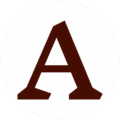If you’re a 60s kid, I’m sure you remember the joy of discovering a brand new Little Golden Book as a child! The excitement of seeing the shiny gold spine on the bookshelf and exploring it makes many of us nostalgic today!
But do you know that some of these vintage Little Golden Books could now be worth a fortune? This value guide explores the world of Little Golden Books collecting, revealing what factors influence a book’s worth and how to spot rare editions!
Brief History of Little Golden Books
Little Golden Books is a series of American children’s books that started back in 1942. Georges Duplaix, along with Simon & Schuster, introduced these cheaper books with the purpose of making children’s books affordable compared to the pre-1940s books priced at $2 to $3 ($40 to $70 today).
Western Publishing and Simon & Schuster released the Little Golden Books Series of twelve staple-bound books, each 48 pages long. These books were priced at just 25 cents, which quickly made them popular.
Soon, the Books adapted the stories and characters from popular animated shows and cartoons, including Walt Disney’s. The first Disney Little Golden Book, “Through the Picture Frame,“ was released In 1944 published the first Disney book. Later, “Ben and Me,” “Bambi,” and many more Disney books followed.
Since 1942, about 2 billion copies of Little Golden Books have been published. Among these, the vintage ones from the 1940s to 1970s are precious collectibles today!
Factors Affecting the Value of Vintage Little Golden Books
Generally, a rare first edition Little Golden Book from the 1940s or 1950s, written or illustrated by a notable author or artist with its original cover art and in ‘Mint’ or ‘Near Mint’ condition, can be worth up to $1,000 to $5,000.
However, even well-loved copies in lesser condition can still hold value due to their nostalgic appeal, popular author or illustrator’s work, and historical significance. So, let’s see what determines the worth of a vintage Little Golden Book.
Book’s Condition
The condition of a Little Golden book significantly impacts its worth. Generally, books in Mint or Near Mint condition command the highest prices, while ones with damage like stains, torn pages, or writing are worth much less. For instance, a 1958 “Jack’s Adventure” Little Golden Book ‘A’ edition in near mint or good condition sold for $$275 on Etsy!
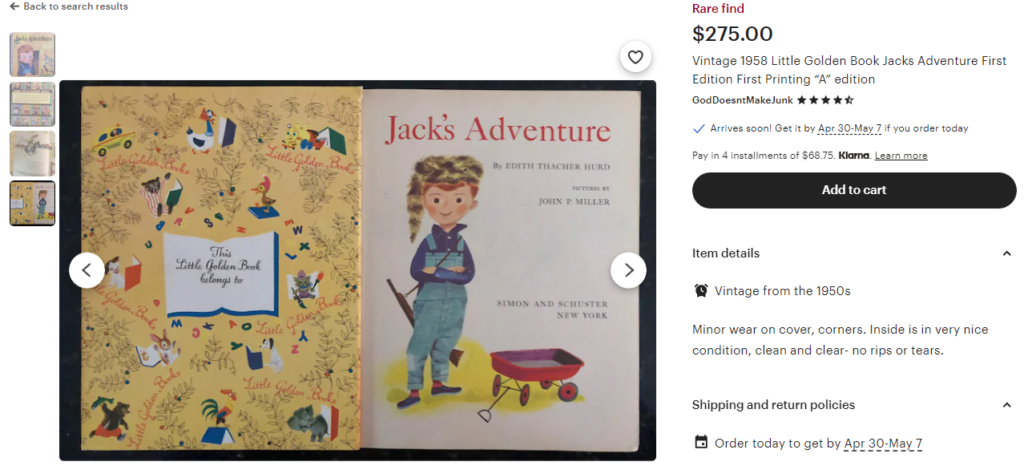
According to the official Little Golden Book Collector website, a vintage Little Golden Book’s condition is rated on a scale from junk to mint, as shown in the following table.
| Grade | Book’s Condition |
| Junk | Missing or torn pages, torn covers, loose binding, etc |
| Poor | Torn pages or the cover, writing on the pages |
| Good | Has been read and has minimal wear & tear on the cover & pages |
| Near Mint | Has been read but is still like a new book with minimal handling signs |
| Mint | Just like bought right from the (unread or unopened), pristine condition |
Edition Age
Generally, the early editions of Little Golden books from the 1940s-1960s fetch the highest returns. Especially, the first editions from the 1940s can be worth up to $500 or more, while the 1970s-1990s editions are worth less.
For example, an ‘A’ First Edition copy of the 1948 Simon and Schuster’s “Little Black Sambo” sold for $175 on eBay. On the other hand, a 1990s Eloise Wilkin’s “Mother Goose” Golden Book sold for almost $2.
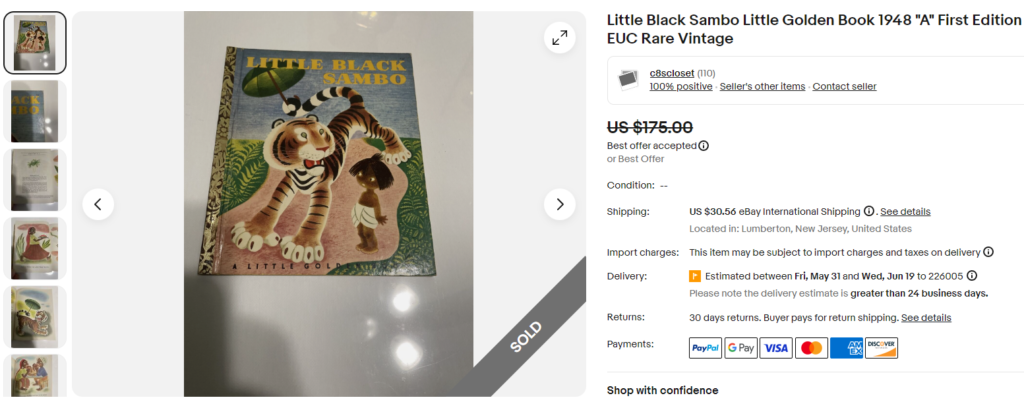
You can estimate the publishing date of a Little Golden book based on the numbers and letters printed on and inside the book using the clues below:
- 1942-1946: Edition number printed on the first or second page, such as First printing, Nov.1942.
- 1947-1970: Edition letter (A-Z) printed on the lower right corner of the inside of the back cover (near the spines). Here, the letters A to Z directly indicate the edition number (1st to 26th); letter A is the first edition, B is the second edition, and so on and so forth.
- 1971-1991: Series of letters on the first few pages. The edition letter is on the far left bottom.
- 1991 – 2001: A combination of Roman numerals and the letter A or R was used, where A means the first edition and R means a ‘revised’ edition.
Another way to find the publishing/release date of a Little Golden book is by the sale price printed on the upper right corner of the book cover. The table below shows how the printed sale price corresponds to the edition year.
| LGB Edition Years | Printed Price (On Cover) |
| 1942 – 1962 | 25 cents |
| 1962 – 1968 | 29 cents |
| 1968 – 1974 | 39 cents |
| 1974 – 1977 | 49 cents |
| 1977 – 1979 | 59 cents |
| 1979 – 1982 | 69 cents |
| 1982 – 1986 | 89 cents |
| 1986 – 1990 | 99 cents |
Summing up, these are the key features of the early, first edition Little Golden Books:
- The book price “25 cents” printed on the front cover
- “A Edition” printed on the back cover.
- No printing listed on the first page.
- Blue binding (earliest books)
Famous Authors and Illustrators
LGBs featuring the work of notable authors and illustrators are often more collectible. Some can sell for over $100 to $1,000, depending on the condition and edition. For example, a 1950 Brave Cowboy Bill Little Golden Book 1st Edition with Richard Scarry’s illustrations sold for $100 on eBay. The same book is listed at $175 on AbeBooks!
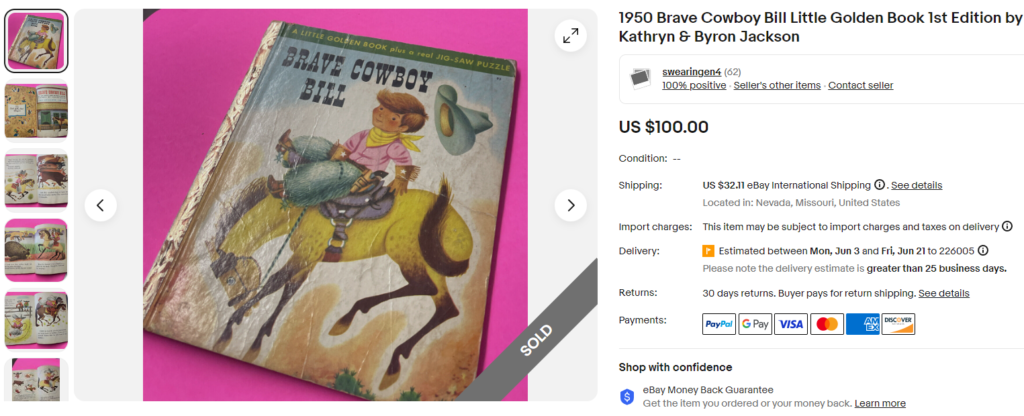
Here are some important authors and illustrators to look for:
- Gustaf Tenggren (Illustrator of “Bedtime Stories,” “The Poky Little Puppy,” & others)
- Richard Scarry (author and illustrator of “The Great Pie Robbery” and others)
- Margaret Wise Brown (author of “Goodnight Moon” and “The Runaway Bunny”)
- Garth Williams (illustrator of “The Friendly Book” and “Baby Farm Animals”)
- Eloise Wilkin (illustrator of various titles, known for her cherubic children)
- Tibor Gergely (illustrator of “Scuffy the Tugboat” and “The Little Red Caboose”)
- Masha (author of one the first 12 books “Three Little Kittens”)
Vintage copies of Little Golden Books with the author’s or illustrator’s autograph can also be highly valuable. But since such signed copies are quite rare, even less-known authors and illustrators’ signed books can be worth a pretty penny.
I found Barbara Collyer’s signed first-edition copy of the 1950 Golden Little Book “Christmas In the Country” that sold for $80.
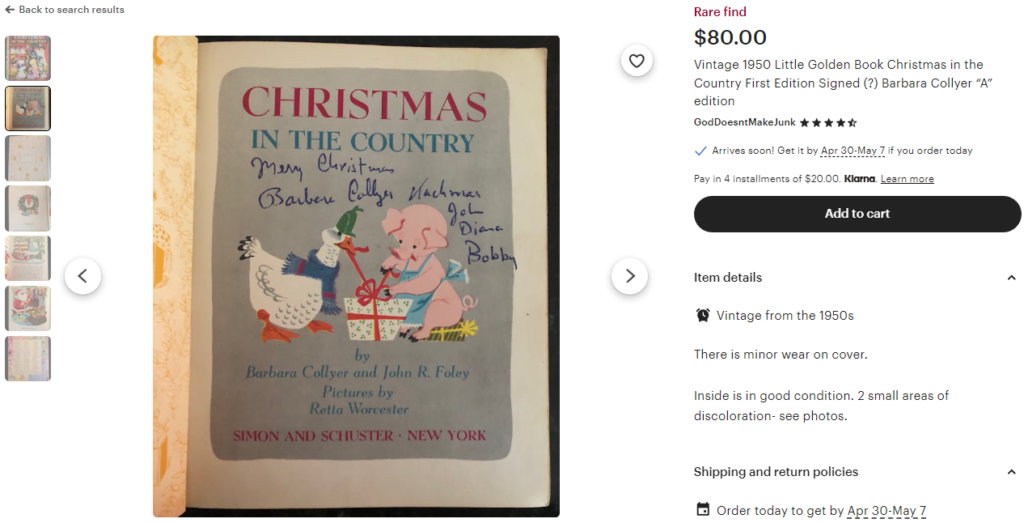
Rarity of the Golden Books
Some Little Golden books are rarer and more desirable than others, often due to their limited print runs or their relevance to significant historical events. Such rare editions can be worth as high as $400 to $5,000 or even more. A rare 1959 Little Golden Book ‘A’ first edition of “We Help Mommy” sold for a whopping $400 on Etsy.
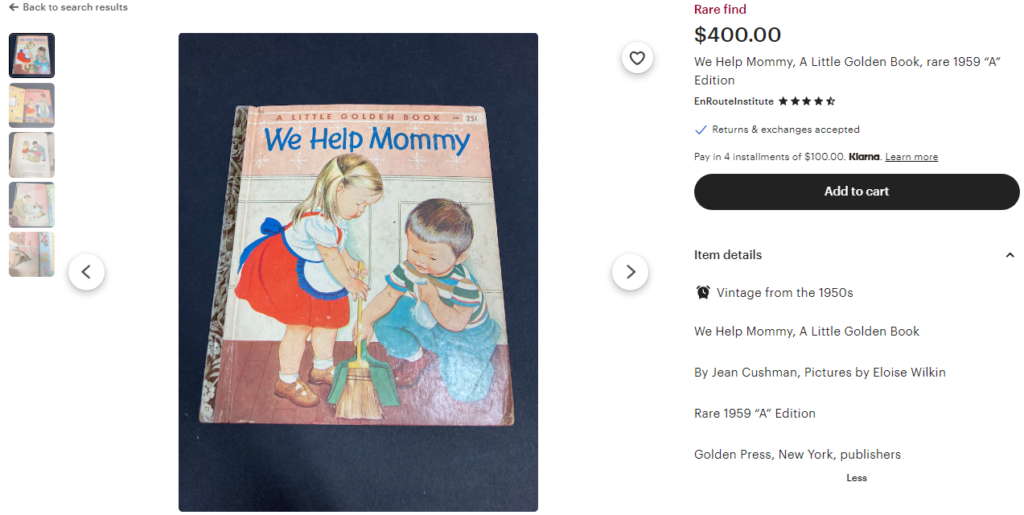
Special Features & Additions
Little Golden books with special features, such as their original dust jackets, are extremely rare to find and can be worth a lot of money. For example, the first edition of “This Little Piggy and Other Counting Rhymes” with the original dust jacket is up for sale at a high price of $1,600!

Similarly, LGBs that come with original special additions, such as jigsaw puzzles, paper dolls, or the rotating wheel as offered in the “Circus Time” book, can sell for $100 or more. I found a rare 1950 “A” printed first edition of “Pets for Peter” with its original jigsaw puzzle that sold for almost $135!
Wartime Editions
Due to paper shortages during wartime in the 1940s, Little Golden Books had to shift to poor-quality papers. So, finding a high-quality Little Golden Book released during wartime (1939 to 1945) is difficult, which makes these editions valuable. For example, a 1943 Simon and Schuster’s The Lively Little Rabbit 1st Printing edition is listed at $200 on AbeBooks.
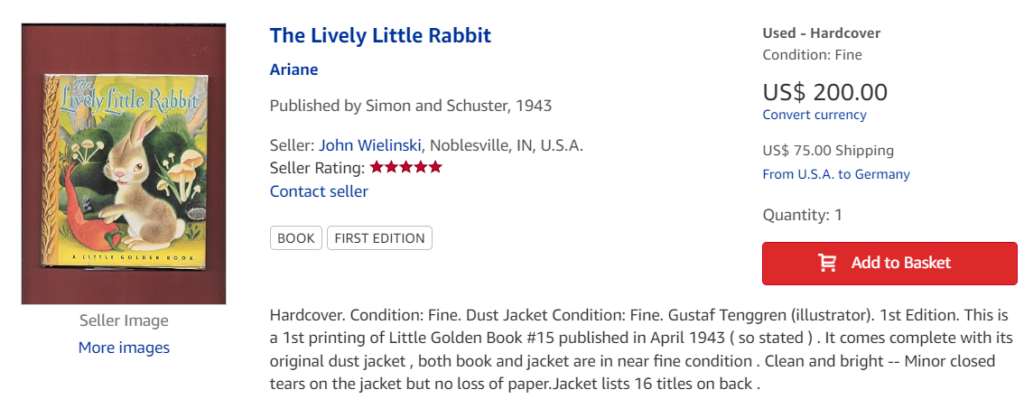
Tiny Golden Books Series
Apart from regular Little Golden Books, Simon & Schuster also released a series of Tiny Golden Books. These books also came with 48 pages each and had interesting animal stories, fairy tales, as well as Disney stories.
Depending on the number of books and their condition in The Tiny Golden Library, they can sell for $50 to $200, while single Tiny Golden Books are generally worth below $10. For example, a Tiny Golden Library of 24 Dorothy Kunhardt books, all in good to near-mint condition, is listed at $90 on Poshmark!
Original Covers
Little Golden books with original cover art, particularly those featuring foil spines or lithographed hardcovers, are generally more valuable than later editions with updated or simplified artwork. The books with blue binding, dating back to pre-1947, are rare and precious.
From classics like “The Little Red Hen” and “Scuffy the Tugboat” to modern tales, Little Golden Books have captured the hearts of kids and adults alike. For collectors, collecting these old children’s books and other vintage toys like Cabbage Patch Dolls and Tonka Trucks is a way to preserve sweet childhood memories!
Note: This article is intended for informational, educational, and entertainment purposes only. Some images are illustrative and may not represent actual brands, products, or related entities. All trademarks, product names, brand logos, packaging, and other intellectual property referenced remain the exclusive property of their respective owners. Any brand mentions or references are provided solely for descriptive and educational context and do not imply any formal or commercial association.

